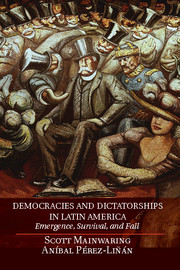Book contents
- Frontmatter
- Dedication
- Contents
- List of Tables
- List of Figures
- Acknowledgments
- 1 Introduction
- 2 A Theory of Regime Survival and Fall
- 3 Competitive Regimes and Authoritarianism in Latin America
- 4 Regime Survival and Fall
- 5 From Multiple Breakdowns to Stabilization of Democracy: Argentina
- 6 From Persistent Authoritarianism to a Durable Democracy: El Salvador
- 7 International Actors, International Influences, and Regime Outcomes
- 8 Political Regimes after the Third Wave
- 9 Rethinking Theories of Democratization in Latin America and Beyond
- Appendix 3.1 Coding Rules for Political Regimes
- Appendix 3.2 Coding U.S. Foreign Policy toward Democracy in Latin America
- Appendix 4.1 Long-Run Equilibrium for the Proportion of Competitive Regimes
- Appendix 5.1 Qualitative Comparative Analysis
- Appendix 6.1 Coding of Salvadoran Actors, 1979–2010
- Bibliography
- Index
7 - International Actors, International Influences, and Regime Outcomes
Published online by Cambridge University Press: 05 June 2014
- Frontmatter
- Dedication
- Contents
- List of Tables
- List of Figures
- Acknowledgments
- 1 Introduction
- 2 A Theory of Regime Survival and Fall
- 3 Competitive Regimes and Authoritarianism in Latin America
- 4 Regime Survival and Fall
- 5 From Multiple Breakdowns to Stabilization of Democracy: Argentina
- 6 From Persistent Authoritarianism to a Durable Democracy: El Salvador
- 7 International Actors, International Influences, and Regime Outcomes
- 8 Political Regimes after the Third Wave
- 9 Rethinking Theories of Democratization in Latin America and Beyond
- Appendix 3.1 Coding Rules for Political Regimes
- Appendix 3.2 Coding U.S. Foreign Policy toward Democracy in Latin America
- Appendix 4.1 Long-Run Equilibrium for the Proportion of Competitive Regimes
- Appendix 5.1 Qualitative Comparative Analysis
- Appendix 6.1 Coding of Salvadoran Actors, 1979–2010
- Bibliography
- Index
Summary
The quantitative analysis in Chapter 4 showed that a favorable regional political environment helped account for both the increased transition rate and the sharp drop in the breakdown rate after 1977. And in Chapter 6 we argued that international actors and influences decisively affected the outbreak of civil war, the transition to a competitive regime, the peace accords of 1992, and the establishment of a democracy in 1994 in El Salvador.
Consistent with our evidence in Chapters 4 and 6, a growing body of literature has recognized the importance of international effects on political regimes (Beissinger 2007; Brinks and Coppedge 2006; Brown 2000; Bunce and Wolchick 2011; Farer 1996; Gleditsch 2002; Gleditsch and Ward 2006; Huntington 1991: 72–106; Levitsky and Way 2010; Lowenthal 1991; O’Laughlin et al. 1998; Pevehouse 2002a, 2002b, 2005; Pridham 1991, 1997; Starr 1991; Stepan 1986; Weyland 2010; Whitehead 1986b, 1991, 1996). The importance of international effects on political regimes has become a consistent finding in quantitative analyses of regime survival and fall and of the level of democracy. As we noted in Chapter 1, the importance of international effects on political regimes suggests a need to rethink conventional comparative politics approaches to the survival and fall of political regimes, which focused exclusively on domestic factors. When they study political regimes, social scientists cannot ignore transnational actors and influences or the interaction between domestic actors and transnational actors and influences.
But what is the role of international influences in creating waves of democratization and authoritarianism? What are the mechanisms through which transnational actors and influences work? And which actors are responsible for these transnational effects? These are the questions we address in this chapter. The literature on international influences on political regimes has not resolved these issues. Quantitative work has shown a causal impact of the regional or neighborhood political environment on the level of democracy, transitions, and breakdowns, but it has done little to explain its aggregate consequences or the causal mechanisms behind this statistical effect (cf. Yee 1996).
- Type
- Chapter
- Information
- Democracies and Dictatorships in Latin AmericaEmergence, Survival, and Fall, pp. 204 - 241Publisher: Cambridge University PressPrint publication year: 2014



